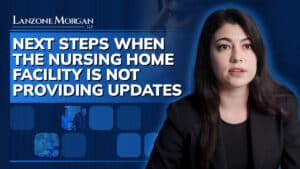
Here’s some general advice for somebody who has a loved one in a nursing home. The more you visit, the more accountable the staff is going to feel for your loved ones’ care. But you have to visit at different times of the day. This particular client went one day at lunch instead of her usual after work visit, and of course, her mother was still in her pajamas, hadn’t been changed, hadn’t been bathed. The nursing home staff learns your patterns of visiting. If you only visit on the weekend, you have no idea what’s happening during the week. Also document everything. One lady came in with her notebook of complaints, and we found a pattern of most of her complaints occurring on the weekend. Because she wrote down the dates, and we could see that every weekend she had complaints, so we knew that this facility was probably understaffed on the weekends. Take pictures if possible. Take pictures of things you notice that are at a place, unexplained bruising toenails that are excessively long or dirty, maybe bed sore.
We get a lot of bed sore cases and we always ask people, do you have pictures of the bed sore? I need to see pictures if it’s a bed sore case. Sometimes, they’re gonna tell you at the nursing home that you’re not allowed to take pictures. That’s not always true. It’s especially not true if you have a healthcare directive or a healthcare power of attorney for your loved one. You should have power of attorney and/or a healthcare directive or a healthcare power of attorney. If you don’t have that, you should have it.
Another thing to do is to speak up. If you’re not speaking up and making your complaints known to the staff, nothing is gonna change. You need to make complaints and you need to make them frequently and to everybody who will listen. And I told you to document those. If you’re having trouble having the staff or anybody listen to you, you can always go to the ombudsman. The ombudsman’s name and phone number should be posted in the facility. Look for that information. Call the ombudsman, tell the ombudsman your complaints. The Ombudsman is supposed to act as the liaison between the facility and the patient and the family.
The Ombudsman is there to try to help solve problems. If the Ombudsman doesn’t help, you can always consider making a complaint to the Department of Public Health. If you call the Department of Public Health, you should tell them you want a complaint investigation, and you should tell them exactly what you want them to investigate. They’re not going to investigate anything that you don’t tell them, okay? So be very specific in your complaints. Frankly, when people call us before they’ve made a complaint to the Department of Public Health, I don’t always tell them to make a complaint to the Department of Public Health.
Sometimes I want to get the records first. So feel free to call our office and tell us your complaints and ask us, do you think I should make a complaint to the Department of Public Health. Sometimes people will call us with complaints and their valid complaints, but they may not rise to the level of a lawsuit. In that case, a lot of times I will tell the family, hey, this doesn’t rise to the level of a lawsuit, but I believe what you’re telling me, what I would do is I would make a complaint to the Department of Public Health. I would ask for a complaint investigation. And then once you get the results of that complaint investigation, call me. Because the Department of Health has the right to walk in and look at the client’s records and do their investigation on the spot. We don’t have the ability to do that. But DPH does. So sometimes their complaint investigations can be early enough and hopefully thorough enough to find out what exactly is going on before the nursing home has a chance to cover anything up.

James Morgan

356 Redondo Avenue,
Long Beach, CA 90814
2801 E. Camelback Rd, Suite 200 Phoenix, AZ 85016
356 Redondo Avenue,
Long Beach, CA 90814
2801 E. Camelback Rd, Suite 200 Phoenix, AZ 85016
Follow Us